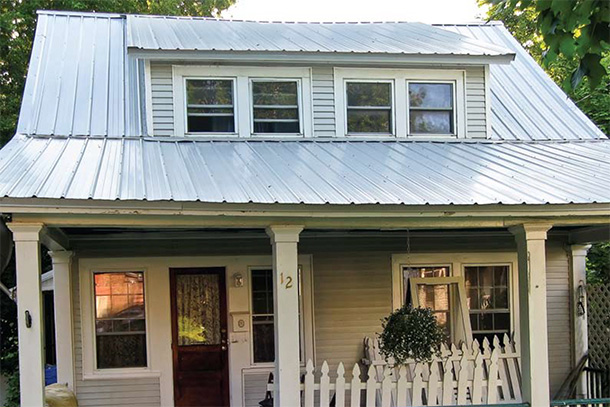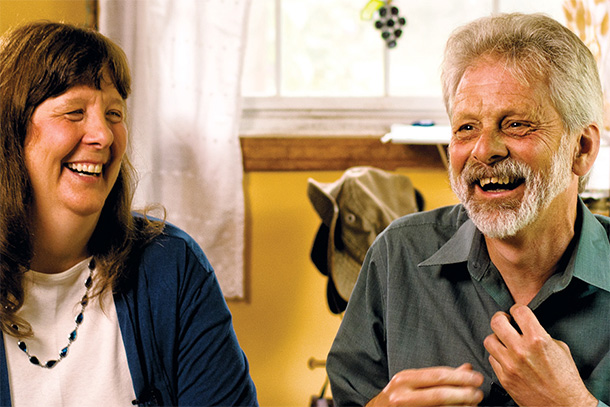Bob Robbins remembers what it felt like to be laid off from his library job as a renter with two young children, and try to live on only his wife's relatively low-paying childcare job.
"We lived in a crowded, substandard apartment," the 57-year-old Burlington, Vermont, resident recalls. "The little money we'd saved went to pay our basic living expenses.
"We were pretty despairing about the possibility we'd ever be able to move into a stable home and not have to move every couple years."
It was the early 1990s. The U.S. economy was reeling from recession and unemployment was high. Though raised in a low-income family, Robbins cherished the dream of finding a long-term home where he and his wife could garden, grow their own food and offer their children a "solid local community" in which to grow up.
He admits, "It was a mystery how we were going to do that."
The mystery was solved by the city of Burlington's mayor at the time, and now Vermont's junior senator -- also the man challenging Hillary Clinton from the left for the Democratic presidential nomination: Bernie Sanders.
As Burlington's mayor from 1981 to 1989, the avowed socialist had established a new housing model in a city facing rising housing costs, gentrification and luxury development pressures.
"He was a 'socialist,' it was the '80s, and he scared everybody!" recalls Brenda Torpy, Sanders' first director of housing, with a laugh. "But the neighbourhoods and tenants were not getting their needs met. People were being pushed out by development."
Sanders created a community development office, Torpy says, "to help implement his progressive agenda." One of its tasks was "to protect people from the market forces of gentrification and displacement," particularly in Burlington's working class and immigrant Old North End neighbourhood.
A hurdle, however, was that the city had neither much land of its own to spare for affordable housing, nor much cash. What it did have was an inclusionary zoning policy that harnessed private development to create new, below-market housing. There were also some state dollars available to boost affordability.
One day, Torpy and her team stumbled on what would become the solution to Burlington's crisis: a community land trust. In this model, a non-profit acquires land that is protected from being put on the market by permanent covenants, and is governed by a board of community members, including residents.
"The model really fit the bill," Torpy says. "So we introduced it to Bernie.
"His answer to everything was, 'Go out there and present it to the public. If they come forward and really want it, the city will give you seed funding.' Well, people embraced it really quickly."
'Cheaper than renting'
Started in 1984 with investment from the city's pension fund matched by a local credit union, the newly created Burlington Community Land Trust bought properties that were being "traded speculatively" in the beleaguered Old North End, Torpy recalls, and established a "sizable trust fund" that continues to support its activities.
After merging with a similar organization 10 years ago, what's now the Champlain Housing Trust spans three state counties and boasts 2,800 homes in its portfolio. Nearly three-quarters are below-market rental suites, but the organization also created 140 co-operative housing units, a $250-a-month mobile home park and a 575-home affordable homeownership program that's served nearly double that number of families.
To qualify to buy a Champlain home, prospective homeowners attend Homebuyer Education Workshops, which have taught thousands of low-income households how mortgages and finances work. Those who qualify for a conventional loan to buy their own condominium or house can have closing costs beyond $3,000 paid by the trust.
"Our goal," says Torpy, who is now Champlain's executive director, "is helping the most vulnerable, who are renters, and creating forms of ownership that are accessible to people who are poor."
The catch: because the land underneath the homes is owned by the non-profit trust, those who buy a house through the homeownership program share 75 per cent of the lift in value if they sell it later on, pocketing whatever part of the house's mortgage they've paid off, and a quarter of their property's accrued value.
The organization's holdings have expanded through 99-year leases on city-owned land. A fund supported by a state property-transfer tax also allows buyers like Robbins to find a property on the conventional market and receive $12,500 toward their down payment if they covenant the land to the trust.
"The only difference was the closing was a little more complicated," Robbins recalls 21 years later of his purchase of a house a half-hour outside Burlington.
"We had accumulated a small amount of savings," he adds, but it would have taken "many, many years" to purchase conventionally.
"I'm not even sure it would have been possible, once we got our kids in childcare," he suspects. "We were able to combine [the state grant] with what savings we had, and we've been here ever since. Our mortgage is around half what renting a two-bedroom apartment in Burlington would cost us."
Land trusts have since sprung up across the United States, but the one set up under Bernie Sanders has burgeoned into one of North America's largest -- a full-scale community developer, planning parks, daycare facilities and other services, rehabilitating old rental buildings, creating supportive housing projects, serving the homeless and preserving the city's heritage.
"We transformed a dilapidated, slummy neighbourhood," Torpy boasts. "Our continuum of service gives people security and an opportunity to move up.
"We actually have people who have gone from homelessness to homeownership. It shows what can be done."
Co-ops 2.0 in Metro Vancouver?
The model has lately caught attention 4,000 kilometres west of Vermont. The Co-operative Housing Federation of B.C. sees its potential to create a new generation of co-operative housing in the high-priced Lower Mainland.
"It's a model whose time has come," says the federation's executive director, Thom Armstrong. "We think that in the next 10 years, we're going to see a real explosion of activity in the community land trust sector."
The federation, in partnership with the City of Vancouver, Vancity Savings Credit Union and others, is in the process of developing three sites under the land trust model on Southeast Marine Drive, Kingsway and Kent Street.
Though the project is behind schedule, Armstrong hopes to see the non-profit his federation founded in 2014 -- the Vancouver Community Land Trust Foundation -- complete one location next summer and another in 2019, delivering 358 units of affordable housing on land leased for 99 years from the municipality.
"There are no external shareholders to deliver a profit margin to," he says of the projects.
Several existing housing co-ops in Surrey and New Westminster, Armstrong adds, are also eyeing the land trust model that's increasingly seen as a way for the form of ownership to survive in decades to come.
"Co-ops are open to redevelopment that actually increases their density," he explains. "If you use a land trust model, where the land can be vested in the trust for perpetuity, you've got a form that actually produces more and better housing over the long haul."
The federation has examined what Vermont's Champlain Housing Trust achieved in Burlington, Armstrong says. "They're quite an amazing organization," he says. "They really do it all."
For those worried about the future of Vancouver's skyrocketing real estate market, Vermont's Sanders-inspired experiment in community land trusts has other lessons as well.
"The model has proven very resilient," Armstrong notes. "The default rate on mortgages in [the] subprime crisis was minuscule in the land trust sector. They proved their strength."
'Integrated' into community
Two decades after Robbins enrolled in a community land trust homeowner preparation course, his family has surpassed his dream. They not only have their garden and grow some of their own food, but their children have excelled in university.
He and his wife remain involved in the community -- volunteering on school, library and childcare committees and, more recently, on Champlain Housing Trust's board of directors.
He calls forsaking three-quarters of the equity gained when he sells his land trust home a worthwhile "trade-off."

"It is true that community land trust owners like ourselves give up something: that future windfall after hanging on to a property for 30 years," he admits. "Sure, we get only a portion of that.
"But for this 25 years, we were able to get into this fantastic place at a reasonable rate and we've been able to raise our family here."
When he sees his own relatives "swimming in debt" from their conventional mortgages, another boon was having more funds to support his kids' interests and start his own library consulting business from his house.
"After we had this opportunity, my wife and I felt much more engaged and motivated to be engaged with our community," he says. "It's not just an isolated group of low-income homeowners. It integrated us much more into the community, and inspired us to give back in a real way." ![]()
Read more: Housing















Tyee Commenting Guidelines
Comments that violate guidelines risk being deleted, and violations may result in a temporary or permanent user ban. Maintain the spirit of good conversation to stay in the discussion.
*Please note The Tyee is not a forum for spreading misinformation about COVID-19, denying its existence or minimizing its risk to public health.
Do:
Do not: